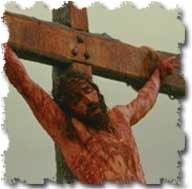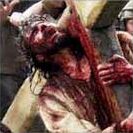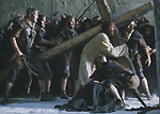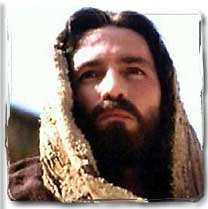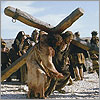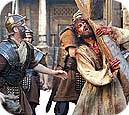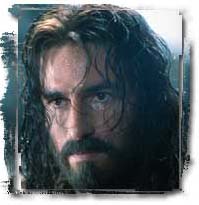THE PASSION OF THE CHRIST....IS IT: SHOCKING? VULGAR? REPULSIVE? OFFENSIVE?.....
Could it be BLASPHEMY? or even HERESY?....It is to some unbelievers and even some who claim to believe the Bible!
As one woman said to those who objected to the bloody beatings of Jesus : "What did you think the floggings and crucifixtion would look like?"
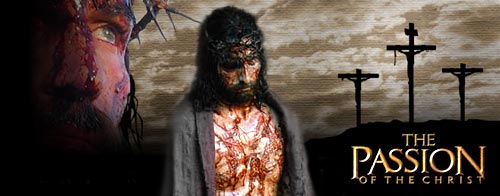
A. W. Tozer's message on the menace of religious movies and what he would say about the
Passion of the Christ motion picture.
|
At first glance one might assume that A. W. Tozer is against all films of every type but one soon finds out that A. W. Tozer is not against all films of every type. He is not against films that educate, teach and instruct. He is not against those films that have been produced for the purpose of introducing souls to Christ on the mission field. What he is for is the preaching of the Word of God, he is for the teaching of the Word of God, his main emphasis in all that he says is Bible, Bible, Bible! A. W. Tozer is a firm believer in the anointed Word of God and believes that God’s Word does not return to Him void.
So what exactly does Tozer mean when he says that gospel films are a menace? This is something that can only be answered by taking into consideration the balance of other various writings by this same author. As a believer in Jesus Christ and in the inerrant, supernatural authorship of the Holy Bible I also believe that the Word of God does not contradict itself as some would claim but that what one observes is merely an apparent contradiction that can be explained with further study. I do not believe that A. W. Tozer is infallible nor would I suggest that he never contradicts himself however there may also be apparent contradictions in the various writings of this modern day prophet that can be explained by further in-depth analysis of the subject upon which he is speaking. In this case I have included ample quotations from Tozer’s teachings concerning the absolute necessity of the cross of Christ and the modern day malady of His portrayal as an effeminate, weak, limp wristed sort of fellow. I have cited many quotes below that are from Tozer’s book called The Attributes of God, Volume 1. His writings place a strong emphasis on the centrality of the cross and the necessity of preaching the blood soaked cross to sinners.
It is also noteworthy to those who might disagree with this exegesis that what is commonly referred to as the "tape" ministry had not arrived on the scene when Tozer was alive. That's right my friend, the simple cassette tape had not even been invented yet at the time during which A.W. Tozer penned his strong stance against "hearing" the Word of God preached in any other format other than having a live experience. A. W. Tozer's proposition regarding the utilization of prerecorded messages is interesting, he is against the prerecorded message format for several good reasons however he clearly states that his position is conditional. To suggest that he would allow for a film to be shown to an ignorant group of tribal people in the Amazon rain forest or in the slums of Mexico City as long as the film is being used by missionaries but he would not permit that same film to be used in this post-Christian America of 2004 is a ridiculous assumption. Had Tozer been able to see the multiple media formats that were on the horizon and how these various media formats would be utilized by ministries all over the world he may have withheld some of his criticism on the subject of prerecorded messages. He could not see that prerecorded preaching and teaching messages would utilize various types of media formats such as the cassette tape, a VHS (video) tape, a film, a CD or a DVD. In Tozer's day the only prerecorded media outside of a film strip was a record album, they did not even have 8 track tapes back then. To claim that Tozer would take a stand against the message of the Passion of the Christ on the grounds that it is a subject matter so delicate and sensitive so as to be the exclusive domain of those who occupy the pulpit on Sunday morning is an absurdity. You will have to agree that for all of his foresight this modern day prophet could not foresee the development of the "tape ministry", the internet or the DVD. In light of this background and with the additional information provided here I hope to show that A. W. Tozer would not reject the message conveyed in the motion picture The Passion of the Christ. He may, like so many others, take issue with some of the finer points or incidental scenes interwoven throughout the whole picture but I am sure that he would not reject the whole because of a disagreement on a minor issue.
A.W. Tozer virtually endorses the motion picture: The Passion of the Christ! Let us hear from A.W. in the following quotations which have been taken from his great work on the Attributes of God, Volume 1.
The question: “How can God, being just, acquit the wicked?”
The title of this message is :The Passion of Christ by: A.W. Tozer “ The answer is from the effect of Christ’s passion. Back in the early days the word “passion” meant deep, terrible suffering. That is why they call Good Friday “Passion Tide,” and we talk about “the passion of Christ.” It is the suffering Jesus did as He made His priestly offering with His own blood for us.Jesus Christ is God, and all I’ve said about God describes Christ. He is unitary. He has taken on Himself the nature of man, but God the Eternal Word, who was before man and who created man is a unitary being and there is no dividing of His substance. And so that Holy One suffered, and His suffering in His own blood for us was three things. It was infinite, almighty and perfect.INFINITE means without bound and without limit, shoreless, bottomless, topless forever and ever, without any possible measure of limitation. And so the suffering of Jesus and the atonement He made on that cross under that darkening sky was infinite in power. (1) “It was not only infinite but ALMIGHTY. It’s possible for good men to “almost” do something or to “almost” be something. That is the fix people get in because they are people. But Almighty God is never “almost” anything. God is always exactly what He is. He is the Almighty One. Issac Watts said about His dying on the cross, “God the mighty Maker died for man the creature’s sin.” And when God the Almighty Maker died, all the power there is was in that atonement. YOU NEVER CAN OVERSTATE THE EFFICACIOUSNESS OF THE ATONEMENT. YOU NEVER CAN EXAGGERATE THE POWER OF THE CROSS.
And God is not only infinite and almighty but PERFECT. The atonement in Jesus Christ’s blood is perfect; there isn’t anything that can be added to it. It is spotless, impeccable, flawless. It is perfect as God is perfect. So the question, “How dost Thou spare the wicked if Thou art just?” is answered from the effect of Christ’s passion. That holy suffering there on the cross and that resurrection from the dead cancels our sins and abrogates our sentence.” (2) “But oh, the mystery and the wonder of the atonement! The soul that avails itself of that atonement, that throws itself out on that atonement, the moral situation has changed. God has not changed! Jesus Christ did not die to change God; Jesus Christ died to change a moral situation. When God’s justice confronts an unprotected sinner that justice sentences him to die. And all of God concurs in the in the sentence! But when Christ, who is God, went onto the tree and died there in infinite agony, in a plethora of suffering, this great God suffered more then they suffer in hell. He suffered with the agony of God, for everything that God does, He does with all that He is. When God suffered for you, my friend, God suffered to change your moral situation.....When God looks at a sinner who has accepted the blood of the everlasting covenant, justice sentences him to live. (3)
I say it again; Justice is on the side of the returning sinner. First John 1:9 says, “If we confess our sins, he is faithful and just to forgive our sins, and to cleanse us from all unrighteousness.” Justice is over on our side now because the mystery of the agony of God on the cross has changed our moral situation. So justice looks and sees equality, not inequality, and we are justified. That’s what justification means.’ (4) “...the cross of Christ. When Jesus died on the cross the mercy of God did not become any greater, It could not become any greater, for it was already infinite. We get the odd notion that God is showing mercy because Jesus died. No-Jesus died because God is showing mercy. It was the mercy of God that gave us Calvary, not Calvary that gave us mercy...” (5)
“ Mercy cannot cancel judgment apart from atonement. When justice sees iniquity, there must be judgment. But mercy brought Christ to the cross. I do not claim to understand that. I’m so happy about the things I do know and so delightedly happy about things I don’t know. I don’t know what happened there on that cross, exactly; I know He died. God the Mighty Maker died for the sin of man, the creature. I know that God turned His back on that holy, holy Man. I know that He gave up the ghost and died. I know that in heaven is registered atonement for all mankind. I know that! And still I don’t know why, and I don’t know what happened.“ Whatever your denomination....You can’t go to heaven on spirituals and choruses and cheap books, but you can go to heaven on the mercy of God in Christ. That’s what the Bible teaches. Justification means that mercy and justice have collaborated so that when God turns and sees iniquity, and then sees the man of iniquity rushing to the cross, He no longer sees iniquity but justification. And so we’re justified by faith.” Pg. 87
A great old theologian once said, “Don’t reject a fact because you don’t know a method.” Don’t say it isn’t so because you don’t know how it’s so. There is much you can’t explain. ...I don’t know how God can suffer. That is a mystery I may never know. A lot of hymn writers who should have been cutting grass at the time have written songs instead. One of them says this: “ I wonder why, I wonder why He loved me so. I will love and pray that I might know why He loved me so.” You will never know that. There is only one answer to why God has mercy on you; because God is mercy, and mercy is an attribute of the Deity. Don’t ask God why, but thank Him for the vast wondrous how and fact of it.” 6 Don’t pity yourself. Don’t be afraid to tell God your troubles. He knows all about your troubles. There is a little song that says “Nobody knows the trouble I’ve seen,” but there’s Somebody who knows, all right. And our Fellow Sufferer still retains a fellow feeling for our pains and still remembers in the skies His tears, His agonies and cries....He hasn’t forgotten us, and He hasn’t forgotten the nails in His hands, the tears, the agonies, and the cries.” (7) “ ....the infinite love of Jesus Christ, which has saved, and continues to save, many the world over. There is a classical Greek word (aletheia) which simply means “unforgetting” (derived from lethe which is the name given to water from Homer’s River Lethe which caused forgetfulness in those who drank it). It has unfortunately become part of the ritual of the modern secular existence to forget. The film, (The Passion of the Christ) is meant to be contemplative in the sense that one is compelled to remember (unforget the suffering of Christ) in a spiritual way which cannot be articulated, only experienced.” 8
“After Moses and before the cross and after the cross and since the cross and during all that dispensation, during any dispensation, anywhere, any time since Abel offered his first lamb before God on the smoking altar – nobody was ever saved in any other way than by grace.....grace always comes by Jesus Christ. The law was given by Moses, but grace came by Jesus Christ. This does not mean that before Jesus was born of Mary there was no grace. God dealt in grace with mankind, looking forward to the Incarnation and death of Jesus before Christ came. Now, since He’s come and gone to the Father’s right hand, God looks back upon the cross as we look back upon the cross. Grace came by Jesus Christ. And everybody that’s been saved since the cross is saved by looking back at the cross.” 9 “The grace did not come when Christ was born in a manger. It did not come when Christ was baptized or anointed of the Spirit. It did not come when He died on a cross; it did not come when He rose from the dead. It did not come when He went to the Father’s right hand. Grace came from the ancient beginnings through Jesus Christ the eternal Son and was manifest on the cross of Calvary, in fiery blood and tears and sweat and death.” 10 “If I want to know this immeasurable grace, this overwhelming, astounding kindness of God, I have to step under the shadow of the cross. I must come to where God releases grace. I must either look forward to it or I must look back at it. I must look one way or the other to that cross where Jesus died. Grace (blood) flowed out of His wounded side. The grace that flowed there saved Abel – and that same grace saves you. “No man cometh unto the Father, but by me,” said our Lord Jesus Christ(John 14:6). And Peter said, “There is none other name under heaven given among men, whereby we must be saved,” except the name of Jesus Christ (Acts 4:12).” 11
“But this one act of Jesus, this divine act, is also a human act. It couldn’t have been a divine act alone, for it had to be for man. It couldn’t have been a human act alone, for only God could save. It was a human act and a divine act. It was a historical act, a once-done act, done there in the darkness on the tree – hidden there, that secret act in darkness, never repeated. It was owned and accepted by God the Father Almighty who raised Him from the dead the third day and took Him to His own right hand..” 12
“...Let’s stand and gaze at the cross and say, “Oh Lord God,...Worthy is the Lamb that was slain!” 13 “If you’re out of the grace of God. Do you know where the grace is? Turn your eyes upon Jesus and there’s the grace of God flowing free for you – all the grace you need. If you set your teeth against Him, the grace of God might as well not exist for you. And Christ might as well not have died. But if you yield to Him and come home, then all the overwhelming, incomprehensible plentitude reaches of God’s nature are on your side. Even justice is on the side of the returning sinner: “He is faithful and just to forgive us our sins and to cleanse us from all unrighteousness” (1John 1:9). All the infinite attributes of God rejoice together when a man believes in the grace of God and returns home. A prayer by A. W. Tozer Father, we pray for all of us, that Thou wilt sweep away our self-righteousness, even any little, ragged traces of self-righteousness that may be left. SAVE US FROM OURSELVES. Let grace abound from Calvary, and teach us that it is not by grace and something else, but by grace alone, Thy goodness, Thy kindness in Christ Jesus. This we ask in the name of the Lord who loves us. Amen.” 14 1. The attributes of God by: A.W. Tozer volume 1, page 67. 2. Ibid., page 68 3. Ibid., page 70 4. Ibid., page 72 5. Ibid., page 82 6. Ibid., page 89 7. Ibid., page 94 8. The Passion, Forward, Mel Gibson 9. The attributes of God, by: A.W.Tozer volume 1, page 101 10. Ibid., page 102 11. Ibid., page 108 12. Ibid., page 109 13. Ibid., page 111 14. Ibid., page 115
If A. W. Tozer were alive today in this post-Christian culture I am certain that he would see that this nation is not the same as the one he knew back in the 50’s. He would see a nation awash in immorality, homosexual perversion, gay marriage, the active removal of every vestige of God in the public square, removal of “under God” in the pledge, abortion on demand, divorce rates as high as 50% in mainline churches, gay ministers and bishops, Queer Eye for the Straight guy on T.V., drug abuse, AIDS, corporate scandals, Harry Potter and The Left Behind series!....Yes, I think that if A.W. was here today he would hardly have any issue with the motion picture The Passion of the Christ, as a matter of fact I believe that A. W. Tozer, like so many other Bible believers, would see the benefits of this picture as it presents the bloody cross of Christ to a sin hardened, modern day Ninevah! The PASSION OF THE CHRIST motion picture contains quotes from the Holy Bible and follows the New Testament Biblical record of the crucifixtion of Jesus Christ while incorporating elements from the Old Testament, from tradition, and from non-Biblical sources. I maintain that the material that was incorporated into the story line, while not derived exclusively from the Holy Bible is, never-the-less, minor. These small segments of the whole are imaginative and neither offensive or grossly inconstant with the historical/cultural period. Having studied this piece by A.W. Tozer I have a few observations to make. First of all some practical hermeneutics are needed in order to comprehend what A. W. Tozer was reacting to at the time that he penned this piece on religious films. While at the breakfast table I asked my wife what she thought Mr. Tozer might be talking about in regards to: The Menace of Religious films, her first response was “wasn’t he alive back in the 50’s? He must have been talking about the Ten Commandments.” I told her the same thing that I will tell you my friend, you are not far from the truth. The fact is that in order to accurately evaluate what A.W. Tozer was commenting on, we need to establish the cultural and historical setting in which he was saying all of this. We need to go back to that time and find out what kind of “Gospel Films” he was referring to. He certainly was not talking about “The Ten Commandments” which of course was a big budget Hollywood box office production with names like Charlton Heston and the like. What A. W. Tozer was talking about was low budget, cheesy, amateurish Gospel Films that were being produced and distributed by several organizations during the 1950’s and rented to dead churches all over the country. These spiritually dead churches had substituted the preaching of the Word of God at their Sunday night services for a night of cheap “Christian” entertainment. Gospel Films Incorporated was one of those companies; it’s founders name was Ken Anderson. Others who were pioneers in the business were Harvey W. Marks who started the Visual Aid Center in 1945 and Harry Bristow who launched the “Christian Cinema.” One of the other names in the Christian film business was none other than Billy Graham. Billy Graham was introduced to Dick Ross, owner of Great Commission Films, in 1949. During Graham's Portland campaign in 1950, Ross produced a documentary film on the crusade and its activities. The film's success led to the Great Commission Films being bought out by the BGEA, and the assets of the company were used to start The Billy Graham Evangelistic Film Ministry, which was incorporated in Maryland in 1952. Dick Ross was the company's first president. The company was generally known as World Wide Pictures (WWP), but this did not become its legal name until 1980. The purpose of WWP was to produce and distribute films about BGEA crusades. Many of these would combine a fictional or true story of a person's conversion with scenes from an actual crusade, including portions of a sermon by Graham. Mr. Texas was the first World Wide feature film. It was made during the 1951 Fort Worth Crusade and premiered at the conclusion of the Hollywood Bowl Crusade. Other feature films followed, including For Pete's Sake, The Restless Ones, The Hiding Place, and Joni. In an attempt to resolve what A. W. Tozer might say about the Passion of the Christ picture we first have to ask what the film is about. Since it is about the last 12 hours of the earthly ministry of our Savior and since it relies heavily on the Biblical narrative as well as incorporating elements of prophetic, allegorical and figurative Biblical texts we need to see how this lines up with the definition of “Gospel Films” which A. W. Tozer constantly refers. -
10 POINTS The following points could be made after reading Tozer’s message on the menace of religious films or movies.
“The "service" where such a movie would be shown might seem much like any other service until time for the message from the Word of God. Then the lights would be put out and the picture turned on. The "message" would consist of this movie. What followed the picture would, of course, vary with the circumstances, but often an invitation song is sung and a tender appeal is made for erring sinners to return to God.” Quotes from A. W. Tozer on The Menace of the Religious Movie.
"That I may be as clear as possible, let me explain what I do and do not mean by the religious movie. I do not mean the missionary picture nor the travel picture which aims to focus attention upon one or another section of the world's great harvest field. These do not come under consideration here." Quotes from A. W. Tozer on The Menace of the Religious Movie
Information on the Jesus Film: “The JESUS Film" In 1978 production began on the Jesus film. Campus Crusade for Christ funded the $6 million production. After the movie's 1979 theatrical release, Paul Eshleman was asked to lead the The Jesus Film Project. Portions of the Jesus film have been translated into 816 languages. More than five billion people have viewed this movie making it the most widely seen movie ever made.Small film teams traveling with battery-powered projectors travel Asia and Africa showing the movie to some people that have never seen a movie before. In the United States churches are buying the video in bulk and distributing it in door-to-door outreaches.The Jesus Film Project may be the best known missions-oriented film outreach but it is not alone. Gospel For Asia's film ministry uses the film Man of Mercy to share the Gospel. This film features an Indian cast. Mars Hill, a media ministry in Texas, has produced The Hope as a tool for world evangelism. The movie uses three storytellers to present an overview of the Bible from Genesis to Revelation by covering 36 significant events in scripture in 90 minutes. For international distribution Mars Hill intends to break down racial barriers by replacing the storytellers with people of different ethnic backgrounds."
The information above has been taken from the Christian Film history web site at: http://www.christianheadlines.com/filmhistory.html
“For the motion picture as such I have no irrational allergy. It is a mechanical invention merely and is in its essence amoral; that is, it is neither good nor bad, but neutral. With any physical object or any creature lacking the power of choice it could not be otherwise. Whether such an object is useful or harmful depends altogether upon who uses it and what he uses it for. No moral quality attaches where there is no free choice. Sin and righteousness lie in the will. The motion picture is in the same class as the automobile, the typewriter, or the radio: a powerful instrument for good or evil, depending upon how it is applied. Quotes from A. W. Tozer on The Menace of the Religious Movie.
“For teaching the facts of physical science the motion picture has been useful. The public schools have used it successfully to teach health habits to children. The army employed it to speed up instruction during the war. That it has been of real service within its limited field is freely acknowledged here.The harm lies not in the instrument itself, but in the evil will of those who use it for their own selfish ends.That I may be as clear as possible, let me explain what I do and do not mean by the religious movie. I do not mean the missionary picture nor the travel picture which aims to focus attention upon one or another section of the world's great harvest field. These do not come under consideration here.” Quotes from A. W. Tozer on The Menace of the Religious Movie.
"...but the truth requires me to say that they are infinitely below their models, being mostly awkward, amateurish and, from an artistic standpoint, hopelessly and piteously bad.” “Let us not for the sake of peace keep still while men without spiritual insight dictate the diet upon which God's children shall feed. I heard the president of a Christian college say some time ago that the Church is suffering from an "epidemic of amateurism." That remark is sadly true, and the religious movie represents amateurism gone wild. Unity among professing Christians is to be desired, but not at the expense of righteousness.” Quotes from A. W. Tozer on The Menace of the Religious Movie.
“If the present vogue continues to spread it will not be long before any man with enough ability to make an audible prayer, and mentality enough to focus a projector, will be able to pass for a prophet of the Most High God. The man of God can play around all week long and come up to the Lord's Day without a care. Everything has been done for him at the studio. He has only to set up the screen and lower the lights, and the rest follows painlessly.” “Wherever the movie is used the prophet is displaced by the projector. The least that such displaced prophets can do is to admit that they are technicians and not preachers. Let them admit that they are not God-sent men, ordained of God for a sacred work. Let them put away their pretense. Allowing that there may be some who have been truly called and gifted of God but who have allowed themselves to be taken in by this new plaything, the danger to such is still great. As long as they can fall back upon the movie, the pressure that makes preachers will be wanting. The habit and rhythm which belong to great preaching will be missing from their ministry. However great their natural gifts, however real their enduement of power, still they will never rise. They cannot while this broken reed lies close at hand to aid them in the crisis. The movie will doom them to be ordinary.” Quotes from A. W. Tozer on The Menace of the Religious Movie.
“In the '50s World Vision provided films to churches for the cost of shipping ($3) with the requirement that churches take an offering for the mission group of their choice. Churches could choose between the films China Challenge, Cry in the Night and Dead Men on Furlough.” The information above has been taken from the Christian Film history web site at: http://www.christianheadlines.com/filmhistory.html Christian Movie Studios Emerge "In 1949 Ken Anderson, editor for a Youth For Christ magazine, decided to form a small studio. An old shut-down dancehall was purchased and moved onto some donated land to become the first home for Gospel Films. The company grew into the largest Christian film distributor. Gospel Films distributes Bamboo in Winter, Through Gates of Splendor and The Wait of the World (trailer). In 1950 Dick Ross' Great Commission Films produced a documentary of Billy Graham's Portland crusade. Seeing the potential of Christian films, the Billy Graham Evangelistic Association created World Wide Pictures as a subsidiary in 1951 to produce and distribute Christian films. Ross would direct their first film, Mr. Texas. Other WWP movies include The Hiding Place, Something to Sing About and The Climb. In 1960 Ken Anderson left Gospel Films and launched Ken Anderson Films. The new studio's objective was to reach an international audience with Christian media and filmed seven movies in Africa. Ken Anderson Films is perhaps best known for the movie Pilgrim's Progress which featured stage actor and later Academy Award winner Liam Neeson in his first film role. Other well-known Ken Anderson Films include Fanny Crosby, In His Steps and Love Note (trailer). Throughout the '50s and '60s Christian films were produced with increasing professionalism and ads for Christian films appeared in magazines like Christianity Today on a regular basis. These films were used by God to reap an abundant harvest. In eleven months two million people viewed The Restless Ones from World Wide Pictures and 120,000 decisions were recorded (source: Christianity Today, October 14, 1966, p.57)." The information above has been taken from the Christian Film history web site at: http://www.christianheadlines.com/filmhistory.html
In his piece on the Menace of religious films Tozer was referring to the company that distributed Christian films to churches during the 1950’s. That company was called “Gospel Films” and it is now called Gospelcom.net. A. W. Tozer was justly taking a shot at the film company and the pathetically dead churches of his time that were turning their Sunday evening service into a time for Christian entertainment! They were forsaking the preaching of the Word of God at church in favor of a Christian movie!
The following is a direct quote from the Christian film history web site regarding this very thing:
From death to rebirth At one time New Year's Eve was THE movie night for the church. Ken Anderson Films would ship about 600 prints for this night. Then the film print stopped being used in churches in the late '80s and early '90s. The drop in Christian film usage was attributed to two trends in the church: (1) Sunday night services in many churches were discontinued and it was during this time when many churches showed the films. (2) A large number of churches replaced film projectors with VCRs and television sets. It would take time for video projectors to be widely adopted in churches. The drop in film rentals led to the closing of every Christian film library. The Christian Film Distributors Association reinvented itself as International Christian Visual Media. Many film producers retired from the business. Some producers turned to distribution for financial survival. Gospel Films started the web portal Gospelcom.net in 1994. Three years later the nonprofit organization changed its name to Gospel Communications International, Inc. Here is a reprint directly from their web site: A Brief History
Gospel Communications International (GCI) is a non-profit Christian ministry founded in 1950 as Gospel Films, Inc., with the conviction that films offer an effective means of reaching people. In 1984, we added video as one of several outreach ministries. In 1994, recognizing the Internet as a powerful new communications tool we founded Gospelcom.net, a strategic alliance of online ministries, by inviting some of the world's most effective Christian organizations to join us in creating a God-honoring Christian presence on the Web. Gospelcom.net's Web servers reside at the GF/GCI offices in Muskegon, Michigan. The Lord has blessed this endeavor as Gospelcom.net has grown tremendously and the alliance has responded with a wealth of online resources for evangelism and discipleship. In late 1997, realizing that the word "films" no longer fully represented the many ministries in which we are involved, we changed our name from Gospel Films, Inc. to Gospel Communications International, Inc. GCI is involved in several other outreach ministries, some not directly related to our worldwide distribution of uplifting Christian film and video.
“...but the truth requires me to say that they are infinitely below their models, being mostly awkward, amateurish and, from an artistic standpoint, hopelessly and piteously bad.” A. W. Tozer
If you still ask: Why is that? My final answer is: Because Tozer would recognize that the film is not some amateurish film with some limp wristed patsy playing the part of Jesus and because we live in a post-Christian society much different than the 1950’s era in which A. W. Tozer lived. I would also suggest that he would endorse this film even though it may not be entirely true to the Biblical record in some minor ways never-the-less it is overwhelmingly accurate on major points concerning the brutal and bloody sacrifice that Jesus made on behalf of sinners. And finally but in no way conclusively, the last reason why A. W. Tozer would endorse this film is that it presents the evangelical church with an excellent opportunity for soul winning as people are confronted with the bloody glory of the crucified lamb! Thank you Jesus for dying for me, in my place on the cross, paying for my sins...I can never repay you. Your indebted servant: Dick Christensen
|
|
LINKS Personal Testimonies Find out what evangelists, preachers and teachers and others are saying about the Passion. MORE LINKS
Here is another title by A. W. TOZER called:
|


